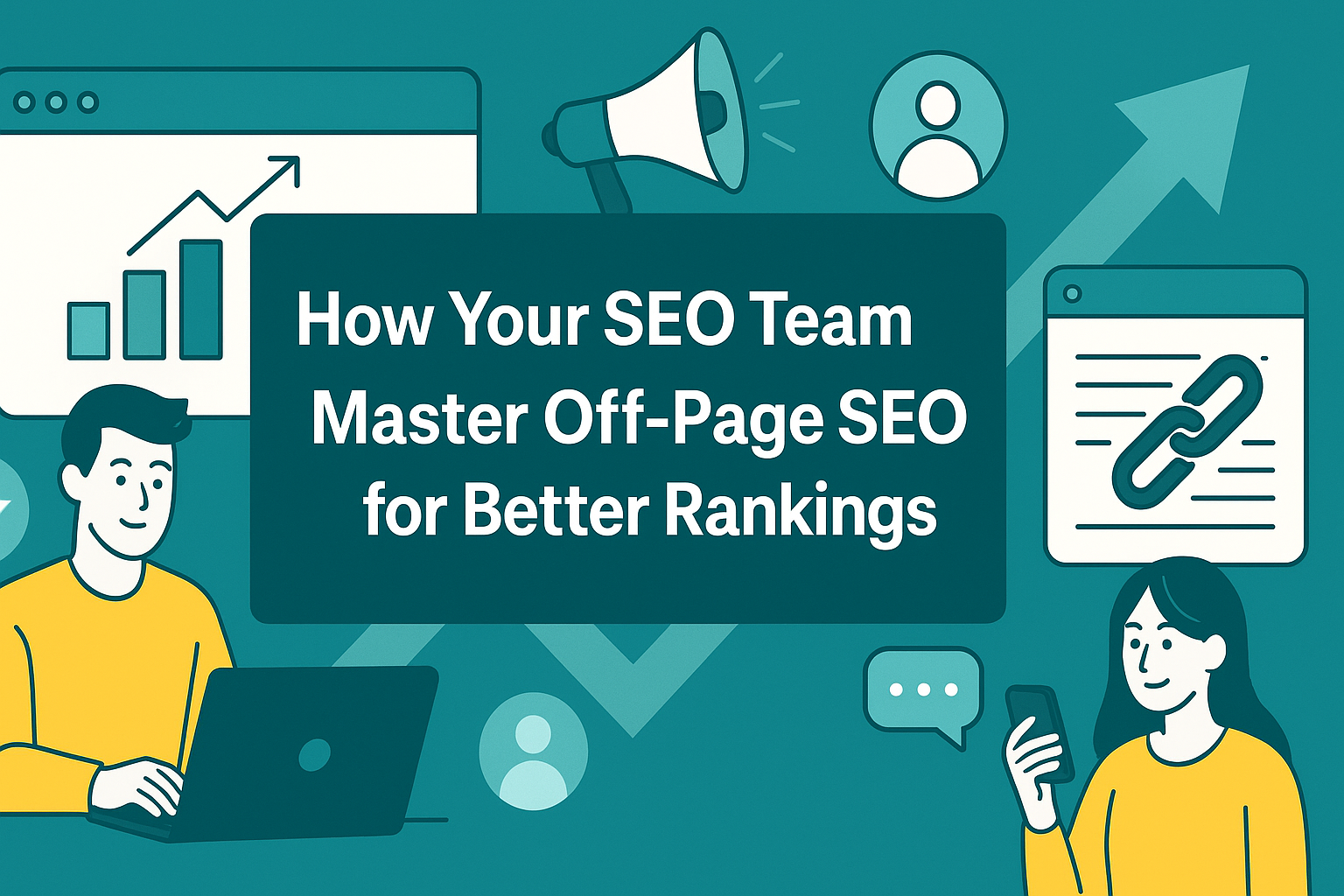
Off-page SEO is all about building your website’s credibility and authority beyond its own pages. It includes things like link building, brand mentions, and content promotion on other platforms. While on-page SEO helps you look good to search engines, off-page SEO tells them others trust you—and that’s what pushes your rankings higher.
What Is A Strong SEO Team?
A strong SEO team plays a big role here. They work together to create a smart off-page strategy that brings real results. From building high-quality backlinks to managing outreach and monitoring performance, every team member has a clear role in improving visibility and search rankings.
The benefits? Better rankings, more organic traffic, stronger brand authority, and long-term SEO success. With the right approach, your team can turn off-page SEO into a powerful growth engine for your business.
Mastering The Fundamentals Of Link Building
Before your team dives into advanced tactics, they need to understand the basics of link building. It all starts here:
Dofollow vs Nofollow Links:
Dofollow links help pass SEO value, while nofollow links do not—but they can still bring traffic and increase brand visibility.
Quality Over Quantity:
A few high-authority links from trusted websites are much more valuable than many links from irrelevant or low-quality sites.
Relevance Matters:
Links from websites in the same niche or industry are more effective because they are contextually aligned with your content.
Your SEO team should also learn how to spot a good link. Is the website active? Does it have useful content? Is it related to your field? These are the questions to ask.
Proven Link Building Strategies That Work
Now, let us talk about tactics. Some strategies work better than others. Here are a few your team can start with:
Guest Posting
Write high-quality articles for other websites and include links to your site where relevant to gain exposure and backlinks.
Broken Link Building
Find outdated or broken links on other sites, then suggest your content as a fresh, working replacement.
Resource Pages
Locate pages that list helpful links and request your content be added as a valuable resource.
Skyscraper Technique
Create better versions of top-performing content, then reach out to sites linking to the original and recommend yours instead.
Local Citations
Get your business listed in online directories and local sites to boost local SEO and attract nearby customers.
The best SEO team uses a mix of these methods, not just one.
Strategic Off-Page SEO Tactics To Grow Authority And Backlinks
Off-page SEO is not just about links. It is about how your brand shows up outside your own site. Here is how your SEO team can grow authority in different ways:
Using Content Marketing To Earn Backlinks
When your team creates content that is helpful, original, and easy to share, other sites will want to link to it. Here are a few ideas:
Publish in-depth guides
Long, useful articles solve real problems and naturally attract links from other websites and blogs.
Share data or insights from surveys
Unique data that is hard to find elsewhere often gets referenced by bloggers, journalists, and researchers.
Make infographics
Visual content is easy to understand and highly shareable, making it a popular link-worthy asset.
Offer free tools or templates
Providing something practical encourages other websites to mention and link to your resource.
People link to things that make their own content better. Help them out.
Boosting Brand Authority With Digital PR
Digital PR means getting your brand mentioned on big websites or in the news. It builds authority and gets links. Your SEO team can:
Pitch unique stories to journalists
Offer a fresh angle or expert opinion that media outlets would find valuable to share.
Share expert opinions
Position team members as thought leaders by contributing insights to industry news and discussions.
Submit to news platforms or blogs
Proactively offer valuable content or announcements to sites that cover your niche.
Use press releases when you launch something new
Share updates about product launches or milestones to attract coverage and backlinks.
This makes your brand look more trusted—and search engines love that.
Executing High-Impact Outreach Campaigns
Outreach is about connecting with people who might link to you. It is not spam. It is about building relationships. Your SEO team should:
Personalize every email
Avoid generic messages—write to people with their name, context, and a reason for contact.
Keep messages short and clear
Respect their time by being direct and getting to the point quickly.
Follow up without being pushy
A polite reminder can help, but do not send too many emails or pressure them.
Offer real value
Give them a reason to care—share something helpful, insightful, or relevant to their audience.
Good outreach builds more than links. It builds a network.
Driving Off-Page Signals Through Social Media & Community
Search engines may not count social shares like links, but they do notice when your content gets popular. Your SEO team can boost visibility by:
Sharing new content on social media
Promote every blog, guide, or video on platforms like LinkedIn, Twitter, or Instagram.
Joining discussions on Reddit, LinkedIn, or Facebook groups
Get involved in relevant communities and share insights or helpful content.
Answering questions on forums like Quora
Provide thoughtful answers and link to your content where it adds genuine value.
When people see your name everywhere, they start to trust you more.
Collaborating With Influencers And Industry Partners
Working with influencers is not just for fashion brands. It works for SEO too. Your team can:
Partner on blogs or webinars
Co-create content that reaches both of your audiences and builds credibility.
Ask for shout-outs or co-posts
A quick mention or quote from a trusted voice can drive traffic and boost reputation.
Get featured in newsletters or roundups
Offer unique content or tools that newsletter creators would love to highlight.
This spreads your reach and earns great links from people who matter in your space.
Analyzing Competitors And Using The Right Tools
Find Where Competitors Get Backlinks
Look at which websites are linking to your competitors. Reach out to those same sites with better content or updated resources to earn backlinks for your site.
Check Top-Performing Content
See which blogs or pages on your competitor’s site are getting the most backlinks. Create even better, more detailed versions to attract similar or better links.
Analyze Referring Domains
Count how many different domains are linking to competitors. It helps you understand how widespread their link-building efforts are and gives you a target to beat.
Identify Link-Worthy Formats
Notice if they are getting links through blogs, tools, videos, or infographics. This tells your SEO team what content formats attract the most attention in your industry.
Find Content Gaps
Compare your site’s content to theirs. If they cover topics you do not, your team can fill those gaps with original content to capture untapped audiences and backlinks.
Monitor Brand Mentions
Use tools to find where your competitors are mentioned online. These sites might be open to mentioning your brand too—especially if your offer is more helpful or current.
Use Backlink Tools Like Ahrefs Or Semrush
These tools show backlink profiles, top anchors, and linking pages. They help your SEO team plan smarter outreach by targeting sites that already link to similar content.
Track Social Shares With Buzzsumo
Find out which of your competitors’ content is going viral or getting shared a lot. Create similar but better content and promote it through your own outreach.
Set Google Alerts For Competitor Names
Be notified when someone talks about your competitors online. Use this info to jump into conversations or reach out to those sources with your own value.
Turn Insights Into Action
Do not just gather data—use it. Create content, build relationships, and reach out with ideas based on what works for your competitors. Let data guide your SEO moves.
Tracking Success And Avoiding Common Pitfalls
Track Referring Domains
See how many unique websites are linking to you. A steady increase usually means your off-page SEO is moving in the right direction.
Monitor Organic Traffic Growth
Use tools like Google Analytics to check if more people are finding your site through search. More backlinks should bring more search traffic.
Watch Keyword Rankings
Keep an eye on where your pages rank for target keywords. If rankings improve, your off-page efforts are likely working.
Track Brand Mentions
Set up alerts to find out when your brand is mentioned online. Some of these mentions can lead to backlink opportunities too.
Use SEO Tools For Reporting
Tools like Ahrefs and Semrush help you monitor backlinks, anchor text use, and domain strength—keeping your team on track.
Avoid Spammy Backlinks
Do not collect links from low-quality or shady sites. These can harm your rankings and damage your site’s credibility.
Do Not Over-Optimize Anchor Text
Avoid using the same keyword-rich anchor over and over. Keep it natural to stay safe and avoid penalties.
Include No Follow Links Too
Even if they don’t pass SEO value, nofollow links can bring traffic and make your backlink profile more diverse and natural.
Review Link Quality Regularly
Every month or two, go through your backlinks. Remove or disavow any that look suspicious or come from irrelevant sources.
Focus On Long-Term Growth
Off-page SEO takes time. Avoid shortcuts. Stay patient and consistent to build real authority that lasts.
Conclusion
Off-page SEO is not something you do once and forget. It takes time, patience, and teamwork. But when done right, it can bring amazing results.
To get there, you need the right people. Start by building an SEO team that knows how to work smart, stay consistent, and adapt quickly. Your in-house SEO team structure should allow flexibility—content creators, outreach experts, data analysts—all working together.
So if you want to become the best SEO team in your industry, focus on learning, testing, and improving every single week.
It is not about having a big team. It is about building the right team. Your SEO dream team is out there—make it happen.
FAQs
Can We Do Off-Page SEO In-House Or Should We Outsource?
Both work. If you have the right in-house SEO team structure, you can manage it internally. Otherwise, outsourcing to experts can save time.
What Are The Common Mistakes SEO Teams Make With Off-Page SEO?
Buying spammy links, ignoring nofollow links, over-optimizing anchor text, and doing outreach without personalization are frequent errors.
How Many People Do I Need To Build An Effective SEO Team?
You can start small with 2–3 members covering strategy, outreach, and content. As you scale, add technical SEO, analytics, and PR roles for deeper impact.
What Is The Ideal In-House SEO Team Structure?
A balanced structure would look like this:
1. One strategist is leading the plan
2. One or two outreach and link-building specialists
3. One content writer
4. One analyst for data and reporting
Can One Person Manage SEO Alone?
Yes, for a small website—but results will be limited. As the site grows, a full SEO team becomes essential for scaling off-page efforts.
Should I Hire An In-House SEO Team Or Outsource?
If you want long-term control and deep integration, go in-house. For fast results or specialized outreach, outsourcing to a trusted SEO agency can be smart.
What Makes A Great SEO Team?
The best SEO team is proactive, data-driven, communicative, and focused on quality over quantity. They know how to build authority without shortcuts
Why Does Off-Page SEO Require A Team Approach?
Because off-page SEO is ongoing, requires research, relationship building, content coordination, and consistent monitoring—something one person usually cannot handle alone.


